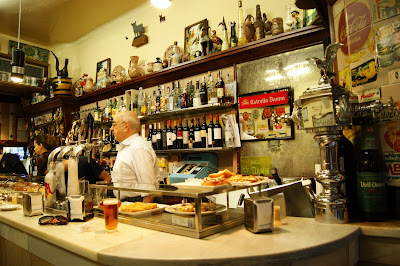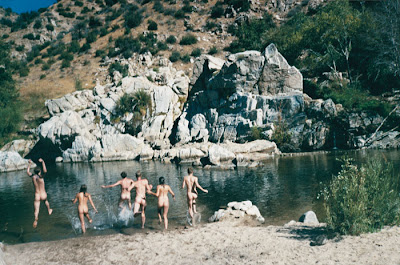Wednesday, June 12, 2024
Love and Leadership: The Role of Love in Shaping Tomorrow's Political Leaders
Wednesday, August 23, 2023
The Reciprocity Principle: The Virtuous Circle of Kindness and Generosity
The saying "you get back what you give" reflects a fundamental aspect of human behavior known as the reciprocity principle. There are psychological, sociological, and evolutionary facts that explain reciprocity, emphasizing its role in promoting kindness and generosity. By exploring the reciprocity principle, we can better understand why being kind not only benefits individuals (making them feel good) and communities but also establishes a virtuous cycle that enhances well-being on multiple levels.
The concept of reciprocity centers on the idea that when one person provides help, support, or kindness to others, they are more likely to feel good than those who do not. Also, they are more likely to receive similar treatment in return. So, what are the psychological mechanisms behind the reciprocity principle?
Psychological Mechanisms:
Norm of Reciprocity: Human beings are wired to reciprocate acts of kindness due to the internalization of social norms. The norm of reciprocity fosters a sense of obligation to return favors, creating a balance in social interactions and strengthening social bonds.
Cognitive Dissonance Reduction: Reciprocity also operates as a cognitive mechanism to reduce discomfort caused by inconsistency. When someone receives a favor, they experience cognitive dissonance if they don't reciprocate, leading them to respond in kind to alleviate this discomfort.
Sociological Implications:
Trust Building: The reciprocity principle contributes to the development of trust among individuals and within communities. Trust forms the foundation of healthy social interactions, enabling cooperation and mutual support.
Social Cohesion: Reciprocity fosters a sense of unity and belonging within groups The act of giving and receiving creates a sense of interconnectedness and encourages people to look out for one another.
Evolutionary Perspectives:
Evolutionary Advantage: The reciprocity principle has roots in evolutionary biology. In ancestral environments, individuals who cooperated and supported each other were more likely to survive and reproduce, leading to the propagation of prosocial behaviors.
Kin Selection and Altruism: Reciprocal altruism extends beyond immediate social circles. Evolutionary theories like kin selection explain how individuals may help even distant relatives due to the potential indirect benefits to their own genetic lineage.
Positive Feedback Loop:The reciprocity principle establishes a virtuous feedback loop. Acts of kindness initiate a chain reaction, inspiring others to reciprocate and generate a continuous cycle of positive behaviors.
Psychological Rewards: Engaging in prosocial behaviors triggers the release of neurotransmitters such as oxytocin and endorphins, leading to feelings of happiness, connection, and satisfaction.
Individual and Societal Benefits:
Enhanced Well-Being: Individuals who practice kindness and generosity experience higher levels of subjective well-being and life satisfaction.
Improved Relationships: Reciprocity strengthens interpersonal relationships, whether in personal, professional, or communal settings.
Collective Thriving: Societies that prioritize reciprocity create environments where citizens support each other, leading to greater social harmony, economic growth, and overall prosperity.
The reciprocity principle is a powerful force that highlights the interconnectedness of human interactions. By understanding the psychological, sociological, and evolutionary dynamics underlying reciprocity, we realize the profound impact that acts of kindness and generosity can have on individuals, communities, and societies. Embracing kindness as a core value not only enhances personal well-being but contributes to the creation of a more compassionate and harmonious world.
Monday, April 29, 2013
Wednesday, June 6, 2012
Wednesday, May 30, 2012
Eros & Psyche
Somewhere in Greece, a King and Queen had three daughters. The first two were beautiful but, their third daughter, PSYKHE (or Psyche) was so beautiful that she was compared to Venus. Venus' pride was deeply hurt by this, so she asked her son, Eros, to "make her fall in love with the most horrendous monster".
As time went by, Psyche's sisters married and had children. No one seemed to be interested in Psyche. Her parents consulted the Oracle. She was ordered to go to the highest part of the mountain to face her destiny.
After a dream, she reached a palace by night where she was approached by a man with whom she spent a night of passion. She stayed there living her days in solitude and her nights in darkness and passion, until one day, she got pregnant. Her sisters had visited her without being able to see her husband's face. They feared it was the monster of Venus' wish. They persuaded Psyche to look at her husband's face while he slept. At night, after having made love, curiosity and fear took over her. Psyche discovered that her husband was Eros himself. He was young and handsome.
Eros woke up to see she had betrayed his trust but confessed he could not follow his mother's orders because he could not resist her beauty. Then, he abandoned her. Psyque was devastated. She wondered the world until Venus found her and put her away. Eros, finally rescued her and they have been living together since. They had a daughter called Hedone which means pleasure in Greek.
Post and translation: Valeria Mendez Cañas
Image: Octavia Minor
Sources: theoi.com ; entrecasa magazine. Bs. As 2012; wiki
Friday, May 11, 2012
Wednesday, May 9, 2012
again
The two of them spent all their time together, either talking or making love.
Robert James Waller,
The Bridges of Madison County
Monday, April 16, 2012
Silvina Ocampo on love
"They loved eachother with tenderness, passion and faithfulness. They tried to always be together and when they had to separate for whatever reason, they thought about eachother so much that their time apart was also a way of being together, more subtle, prudent and avid"
Silvina Ocampo,
Los dias de la noche
Monday, April 9, 2012
The "complete" mother
It's a known fact that parents are responsible for the kind of person that their children become as they grow. For those who are constantly trying to be good parents and find themselves in in the roller coaster that this adventure can become, Stephen B. Poulter, a psychologist who specializes in family relationships gives us some clarity.
Monday, April 2, 2012
Life is too short to...

* not fall in love deeply
* have a job that you don't love
* postpone getting a ticket to go to that place (or places) you've been dreaming of
* not tell people how you feel
* not be who you really are
* not dance and sing MORE
* not spend a quiet day with yourself
* not help make a difference
* not feel gratitude (for the small things also)
* not be a better sister, brother, daughter, son, mother, wife, husband, father, friend, grandfather, grandson, grandaughter...
* not tweet
* not be the best at whatever it is that you do
* not smile
* be too worried about consuming chocolate, coffee, wine
* not read more
* not do sports as often as you can
* not spend more time in contact with nature
* not hug
* not take risks
* not be more curious
Please tell us what other things "life is too short to..." miss. We'd love to know your thoughts on this. xx
Thursday, March 15, 2012
Tuesday, February 14, 2012
Tuesday, February 7, 2012
she, he
Saturday, February 4, 2012
"dusa"

It's always good to ask ourselves questions, no? here are some good ones.
Do you live well?
Do you love deeply?
Are you helpful?
and Three more:
Who are you?
What would you like to do with the rest of your life?
How will you do it?
Knowing ourselves is key in order to define what we want and how to accomplish it.
Thursday, December 1, 2011
Barcelona!














The best part of a journey is the people you meet along the way. And the food.
Photo above is brunch at PICNIC
Wednesday, October 26, 2011
madness
From Captain Corelli's Mandolin Film directed by John Madden and based on the novel of the same name by Louis de Bernières
Monday, October 17, 2011
Saturday, October 15, 2011
living it up

The concept of a bon vivant is associated with the idea of leading a good life, to live well. But what is to live well?
The other day I read an article on LNR where they talked about the good life with Argentinian chef, Mallmann.
For some, the concept of a bon vivant is overly idealized. It means having a life of luxury, 5 star travels, eating at expensive restaurants, buying big brands, a socially important status and collecting art.
For me, that sounds about right, but I also think a good life is related to living life with passion and intensity. To find the beauty in whatever you do. Whether it’s appreciating a painting, feeling the music with your eyes closed, reading, enjoying a good meal, the smell a flower, dancing, visiting a new place, laughing with a friend, reaching a goal and celebrating the love you receive and that you give every day.
That's also happiness.
In this article that I read, Mallman said something that I'd like to share:
A bon vivant "is a person who tries to live romantically, a person who likes to live each day the best way possible. It has to do with your mood, with who you are, with the time of the year, the clothes you like to wear, where you go, what you eat...”
When I was writing this post, I also ran into this definition: "a bon vivant is someone who can say, I live very well, my children are alright, I am not the richest but I can still do pretty much everything that I want to do; I have a partner who has always loved me and who I love and have fun with, I have achieved most of my goals and I'm satisfied"
Finally, I leave you with the definition that Coco Chanel gave when they asked her: "what is fashion?"
“Fashion is not something that exists in dresses only. Fashion is in the sky, in the street, fashion has to do with ideas, the way we live, what is happening.”
Well said Coco! I love this definition of fashion and I find that it has much to do with the concept of a bon vivant. But more importantly, what is it to you?
Enjoy today!
Post by: Valeria Mendez Cañas
Tuesday, October 11, 2011
Plato's cavern

I'm reading Laurent Gounelle's "I Will Not Leave Without Telling You Where I go" and have come across a few passages that deal with something that we sometimes resist: change. The translation is mine because the version I'm reading is in Spanish.
"Today a lot of people live in Plato's Cavern without even realizing it. They are afraid of what is unknown to them and reject any sort of change that affects them personally. They have ideas, projects, dreams but they do not fulfill them because they are often paralyzed by fear. Their feet and hands are held by handcuffs to which they only have the key to unlock. Keys hang in their neck but they never take them.
Life itself is made up of continuous change. It would not make any sense to hang on to the status quo. Only the dead remain still. We not only have to accept change, we also have to start it in order to be able to evolve in the sense that is most convenient to us.
[...] Resistance to change is what makes adults and children differ. Children feel like evolving while adults often do everything they can not to. (perhaps not at a conscious level)
When we no longer feel like evolving, we start to die very slowly...
[...] If you want to be young all your life, continue evolving, learning, discovering, don't lock yourself up in habit that makes your mind get stuck nor in the comfort of what is already known to you because before you know it you could become numb."
Remember that destiny is also an excuse for not making things happen. You create.













